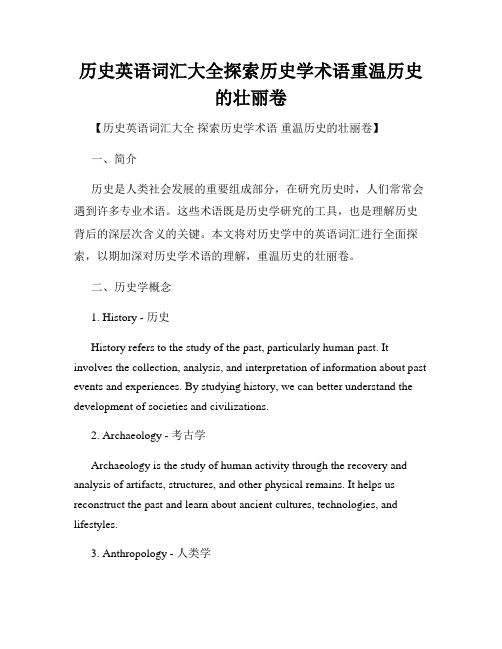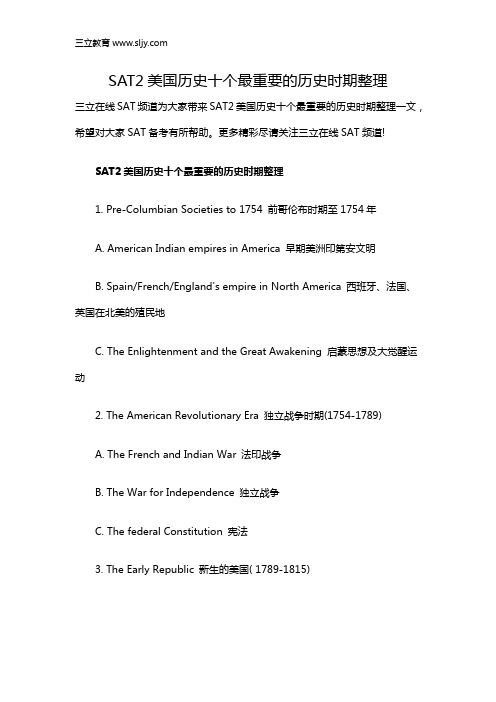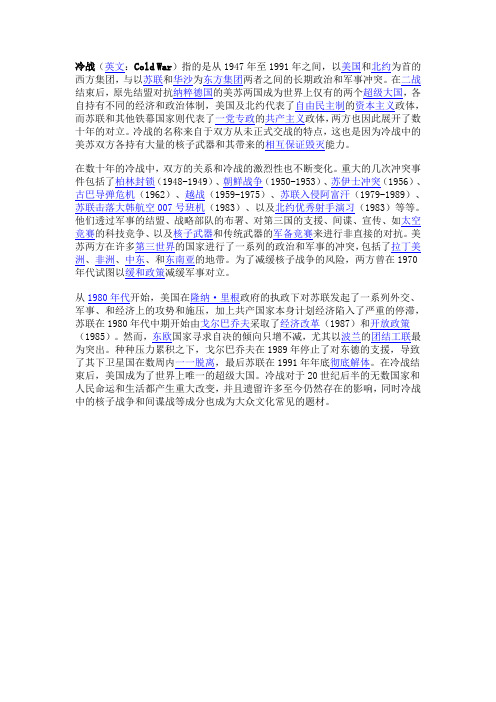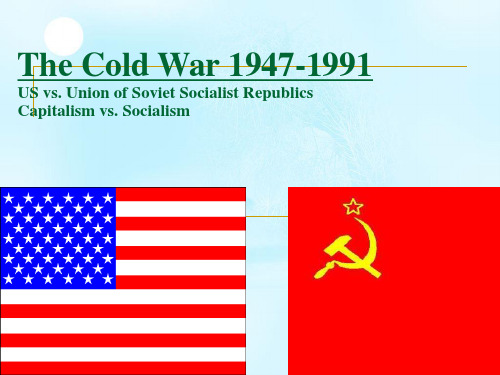The Cold War 冷战
- 格式:ppt
- 大小:1.77 MB
- 文档页数:15

历史英语词汇大全探索历史学术语重温历史的壮丽卷【历史英语词汇大全探索历史学术语重温历史的壮丽卷】一、简介历史是人类社会发展的重要组成部分,在研究历史时,人们常常会遇到许多专业术语。
这些术语既是历史学研究的工具,也是理解历史背后的深层次含义的关键。
本文将对历史学中的英语词汇进行全面探索,以期加深对历史学术语的理解,重温历史的壮丽卷。
二、历史学概念1. History - 历史History refers to the study of the past, particularly human past. It involves the collection, analysis, and interpretation of information about past events and experiences. By studying history, we can better understand the development of societies and civilizations.2. Archaeology - 考古学Archaeology is the study of human activity through the recovery and analysis of artifacts, structures, and other physical remains. It helps us reconstruct the past and learn about ancient cultures, technologies, and lifestyles.3. Anthropology - 人类学Anthropology is the study of humans and human societies, focusing on their culture, biology, language, and social structures. It provides insights into the diversity and evolution of human beings.4. Paleontology - 古生物学Paleontology is the study of prehistoric life through the examination of plant and animal fossils. It helps us understand the history of life on Earth and the evolutionary processes that have shaped different species.5. Historiography - 历史学方法论Historiography refers to the study of historical writing and the methods used by historians to gather and interpret information. It involves analyzing sources, evaluating evidence, and constructing narratives about the past.三、历史时期1. Ancient History - 古代史Ancient history refers to the period of human history before the Middle Ages, typically covering the civilizations of Mesopotamia, Egypt, Greece, Rome, and others. It encompasses a wide range of cultures and developments.2. Medieval History - 中世纪史Medieval history covers the period between the fall of the Western Roman Empire and the beginning of the Renaissance. It includes the rise of feudalism, the spread of Christianity, and the development of chivalry and Gothic art.3. Renaissance - 文艺复兴The Renaissance was a cultural and intellectual movement in Europe that spanned from the 14th to the 17th century. It marked a shift from the medieval to the modern world, with significant advancements in art, science, and philosophy.4. Enlightenment - 启蒙运动The Enlightenment was an intellectual and philosophical movement in Europe during the 18th century. It emphasized reason, rationality, and science, challenging traditional authority and promoting individual freedom and equality.5. Industrial Revolution - 工业革命The Industrial Revolution was a major turning point in human history, characterized by the transition from handmade goods to machine production. It began in the late 18th century in Britain and had far-reaching impacts on society, economy, and technology.四、重要历史事件1. American Revolution - 美国革命The American Revolution was a political and military conflict between Great Britain and thirteen British colonies in North America. It resulted in the formation of the United States of America and inspired revolutionary movements worldwide.2. French Revolution - 法国大革命The French Revolution was a period of radical social and political upheaval in France, resulting in the overthrow of the monarchy and the riseof Napoleon Bonaparte. It had a profound impact on European history andthe spread of democratic ideals.3. World War I - 第一次世界大战World War I was a global conflict that lasted from 1914 to 1918, involving many of the world's major powers. It caused unprecedented destruction and loss of life, leading to significant political and social changes.4. Cold War - 冷战The Cold War was a period of political tension and rivalry between the United States and the Soviet Union after World War II. It was characterized by the arms race, ideological competition, and proxy wars, shaping global politics for several decades.5. Civil Rights Movement - 民权运动The Civil Rights Movement was a social and political struggle for equal rights and racial equality, primarily in the United States. It challenged racial segregation and discrimination, leading to significant legal and social changes.五、结语通过对历史学术语的探索,我们可以更深入地理解过去文明的发展和演变。

SAT2美国历史十个最重要的历史时期整理三立在线SAT频道为大家带来SAT2美国历史十个最重要的历史时期整理一文,希望对大家SAT备考有所帮助。
更多精彩尽请关注三立在线SAT频道!SAT2美国历史十个最重要的历史时期整理1. Pre-Columbian Societies to 1754 前哥伦布时期至1754年A. American Indian empires in America 早期美洲印第安文明B. Spain/French/England's empire in North America 西班牙、法国、英国在北美的殖民地C. The Enlightenment and the Great Awakening 启蒙思想及大觉醒运动2. The American Revolutionary Era 独立战争时期(1754-1789)A. The French and Indian War 法印战争B. The War for Independence 独立战争C. The federal Constitution 宪法3. The Early Republic 新生的美国( 1789-1815)A. Emergence of political parties: Federalists and Republicans 两党制的形成B. Beginnings of industrialization and changes in social and class structures 第一次工业革命4. Religion, Reform, and Renaissance in Antebellum America 内战前的社会改良运动A. Social reforms 社会改革B. Transcendentalism and utopian communities 超验主义及乌托邦团体5. Territorial Expansion 西进运动A. Early U.S. imperialism: the Mexican War 美墨战争B. Pro- and antislavery arguments and conflicts 奴隶制存废的争议6. Civil War and Reconstruction 内战及重建A. Emancipation and the role of African Americans in the war 黑人在内战中的角色B. Presidential and Radical Reconstruction 总统及激进重建7. Industrial America & Progressive Era 工业化美国和进步主义时期A. Labor and unions 工人及工会B. Urbanization and political machine 城市化及政治机器C. Roosevelt, Taft, and Wilson as Progressive presidents进步主义时期的总统及其政策8. WWI and Roaring 20s 一战及飞速发展的20年代A. The First World War at home and abroad 一战对内对外的影响B. The business of America and the consumer economy 消费经济的形成C. Republican politics: Harding, Coolidge, Hoover 20年代的总统及其政策9. The Great Depression and WW II 大萧条及二战A. The Hoover administration's response 胡佛的应对政策B. Franklin Delano Roosevelt and the New Deal 罗斯福及新政C. Diplomacy, war aims, and wartime conferences 二战美国的外交政策、目标及战时会议10. The Cold War 冷战A. Truman and containment 杜鲁门及遏制政策B. The Red Scare and McCarthyism 国内红色恐怖及麦卡锡主义C. Expanding movements for civil rights 民权运动D. The antiwar movement and the counterculture反战运动及反主流文化E. Politics and Economics at the End of the Twentieth Century 二十世纪末期经济及政治。

冷战(英文:Cold War)指的是从1947年至1991年之间,以美国和北约为首的西方集团,与以苏联和华沙为东方集团两者之间的长期政治和军事冲突。
在二战结束后,原先结盟对抗纳粹德国的美苏两国成为世界上仅有的两个超级大国,各自持有不同的经济和政治体制,美国及北约代表了自由民主制的资本主义政体,而苏联和其他铁幕国家则代表了一党专政的共产主义政体,两方也因此展开了数十年的对立。
冷战的名称来自于双方从未正式交战的特点,这也是因为冷战中的美苏双方各持有大量的核子武器和其带来的相互保证毁灭能力。
在数十年的冷战中,双方的关系和冷战的激烈性也不断变化。
重大的几次冲突事件包括了柏林封锁(1948-1949)、朝鲜战争(1950-1953)、苏伊士冲突(1956)、古巴导弹危机(1962)、越战(1959-1975)、苏联入侵阿富汗(1979-1989)、苏联击落大韩航空007号班机(1983)、以及北约优秀射手演习(1983)等等。
他们透过军事的结盟、战略部队的布署、对第三国的支援、间谍、宣传、如太空竞赛的科技竞争、以及核子武器和传统武器的军备竞赛来进行非直接的对抗。
美苏两方在许多第三世界的国家进行了一系列的政治和军事的冲突,包括了拉丁美洲、非洲、中东、和东南亚的地带。
为了减缓核子战争的风险,两方曾在1970年代试图以缓和政策减缓军事对立。
从1980年代开始,美国在隆纳·里根政府的执政下对苏联发起了一系列外交、军事、和经济上的攻势和施压,加上共产国家本身计划经济陷入了严重的停滞,苏联在1980年代中期开始由戈尔巴乔夫采取了经济改革(1987)和开放政策(1985)。
然而,东欧国家寻求自决的倾向只增不减,尤其以波兰的团结工联最为突出。
种种压力累积之下,戈尔巴乔夫在1989年停止了对东德的支援,导致了其下卫星国在数周内一一脱离,最后苏联在1991年年底彻底解体。
在冷战结束后,美国成为了世界上唯一的超级大国。

冰山上的来客英语作文英文回答:The Iceberg Cometh: A Metaphorical Exploration of the Cold War。
The Cold War, a geopolitical stalemate between the United States and the Soviet Union, lasted for nearly five decades and left an enduring legacy on global politics. During this period of intense tension and rivalry, the United States and the Soviet Union engaged in a fierce arms race, ideological battles, and proxy wars around the globe.One of the most striking metaphors used to describe the Cold War is "the iceberg cometh." This metaphor suggests that the Cold War was not merely a superficial conflict but an underlying tension that had the potential to escalate into a full-blown war. The iceberg represents the latent danger that could erupt at any moment, while the waterline represents the surface tension between the two superpowers.The metaphor is apt for several reasons. First, it captures the sense of constant threat and uncertainty that characterized the Cold War. The threat of nuclear war hung over the world like the proverbial sword of Damocles, and both sides were constantly on the lookout for potential threats. The arms race fueled this tension, as each superpower sought to gain an advantage over the other.Second, the iceberg metaphor highlights the importance of ideology in the Cold War. The United States and the Soviet Union represented two opposing ideologies: capitalism and communism. Each side believed in the superiority of its own system and sought to spread its influence around the world. The ideological divide between the two superpowers made it difficult to find common ground and resolve conflicts peacefully.Third, the iceberg metaphor points to the role of third parties in the Cold War. Many countries around the world were caught in the crossfire of the conflict, as the United States and the Soviet Union sought to gain allies andexpand their influence. These countries often became battlegrounds for proxy wars, as the superpowers fought for control over strategic resources and geopolitical advantage.The Cold War ultimately ended with the collapse of the Soviet Union in 1991. However, the legacy of the Cold War continues to shape global politics today. The arms race has left behind a vast arsenal of nuclear weapons, and the ideological divide between capitalism and communismpersists in many parts of the world. The metaphor of "the iceberg cometh" serves as a reminder of the dangers of unchecked rivalry and the importance of finding peaceful ways to resolve international conflicts.中文回答:冰山来客,冷战的隐喻探索。


冷战的英文作文带翻译English:The Cold War was a period of intense geopolitical tension between the United States and the Soviet Union, lasting roughly from the end of World War II in 1945 to the dissolution of the Soviet Union in 1991. It was characterized by ideological, political, and military rivalry, but despite its name, it was not a conventional war with direct military confrontation between the two superpowers.One of the most significant aspects of the Cold War was the arms race, where both the US and the USSR competed to develop and stockpile nuclear weapons. This led to a constant fear of nuclear annihilation, often referred to as "Mutually Assured Destruction" (MAD). The Cuban Missile Crisis in 1962 stands out as a particularly tense moment, when the world came perilously close to nuclear war as the US discovered Soviet nuclear missiles in Cuba.Another defining feature of the Cold War was the concept of proxy wars, where the US and the USSR supported opposing sides in conflicts around the world, such as the Korean War and the Vietnam War. These conflicts served as battlegrounds for the ideological struggle between capitalism and communism, with devastating consequences for the countries involved.Despite the absence of direct military conflict between the US and the USSR, there were numerous instances of espionage, sabotage, and covert operations conducted by both sides. The term "spy games" became synonymous with the clandestine activities undertaken to gain intelligence or undermine the enemy.The Cold War also had profound cultural and societal impacts, shaping everything from popular media toscientific research. The space race, for example, was a direct result of Cold War competition, culminating in the US landing the first man on the moon in 1969. Additionally, the era saw the emergence of spy novels and films,reflecting the intrigue and paranoia of the time.Ultimately, the Cold War came to an end with the collapse of the Soviet Union in 1991, marking the victory of capitalism over communism and the beginning of a new era of global politics.中文:冷战是美国和苏联之间持续时间约为1945年二战结束至1991年苏联解体的一段充满地缘政治紧张的时期。
P32.1.make friends with sb. 和某人交朋友become friends变成朋友friendly adj. 友好的be friendly to sb. 对某人很友好friendship n. 友谊C/U2.sportsman 运动员3.What nationalities were the two men?那两个男的是什么国籍的?4.Put the pictures in the correct order.把图片按正确的顺序排列5.the US table tennis team美国乒乓球队6.at the world championship 参加世界锦标赛7.the People’s Republic of China中华人民共和国8.take(took) place 举行,发生9.during prep. 在...期间10.the Cold War冷战11.player n. (球类运动的)运动员12.even 甚至13.each other=one another 彼此14.invite vt. 邀请invite sb. to do sth. 邀请某人去做某事invite sb. to + 地点邀请某人去某地invitation n. 邀请U,邀请函C15.miss vt. 错过,想念miss the bus 错过公交车missing adj. 消失不见的错过做某事miss doing sth16.surprise n. 吃惊to one’s surprise 让某人吃惊的是surprise vt. 使...吃惊Your answer surprised me.你的答案让我很吃惊。
be surprised to do sth. 很吃惊去做某事be surprised at sth 对某事很吃惊I am so surprised to see you here.很吃惊能在这里看到你。
冷战时期冷战(1947年——1991年12月)冷战(Cold War)一词是当年美国政论家斯沃普在为参议员巴鲁克起草的演讲稿中首次使用的。
二战结束后,美国对苏联和其他社会主义国家采取了敌视和遏制政策,因此巴鲁克说:“美国正处于冷战方酣之中”。
“冷战”与“铁幕”一词同时流行,表示美苏之间除了直接战争外,在经济、政治、军事、外交、文化、意识形态等方面都处于对抗的状态。
【概要表纲】序幕:这个词起源于1947年4月16日伯纳德•巴鲁克在南卡罗来纳州哥伦比亚的一次演说。
此外,1946年丘吉尔访问美国,在这次访问中他发表了著名的铁幕演说:“从波罗的海边的什切青到亚得里亚海边的的里雅斯特,一幅横贯欧洲大陆的铁幕已经拉下”。
间接表示冷战的开始。
开始:杜鲁门主义(1947)结束:苏联解体(1991.12)两大阵营:军事集团:社会主义阵营:苏联为首华沙条约组织(华约1955)资本主义阵营:美国为首北大西洋公约组织(北约1949)实质认识:二战后社会主义力量的壮大引起了资本主义的恐慌冷战是资本主义对社会主义的敌视与矛盾引发的经济竞争与军备竞争与科技竞争【简介】第二次世界大战的乌云刚刚散去,冷战的大幕又从砖瓦废墟上缓缓拉开。
美国和苏联——这一对超级大国,从共同对抗纳粹的威胁中解除出来后,就再没有过真正意义上的和平相处。
希特勒刚一垮台,双方便展开全方位的竞赛,试图用它们的影响力控制整个世界。
与以往战争不同的是,双方都在他国挑起间接的战争对抗,而避免相互间的直接作战冲突。
没有一方希望挑动对方直接作战,因为这意味着全面核战争——人类毁灭的危险,双方在这一前提下形成了冷战的态势。
即便是冷战,美苏双方也积极寻找多种途径与对方展开竞争。
这其中最令人生畏的是军备竞赛,双方囤集了足以让对方毁灭成百上千次的核弹头,并将核弹的打击范围扩大到太空空间。
双方无时无刻不在策划实施着针对对方的间谍活动。
太空竞赛的唯一积极后果是促进了航天事业的发展,苏联人首次在太空航行,而美国人则抢得了登月的先机。
Chapter 17American History (III)America in Post-W.W.II Era (1945—1980s)I. The Origins of the Cold WarBackground冷战的起源和爆发冷战(1945年至1990年)简单来说就是以美国为首的西方集团(即北大西洋公约组织的成员国)和以苏联为首的东欧集团(即华沙条约组织的成员国)之间在政治和外交上的对抗。
这个词起源于1947年4月16日伯纳德•巴鲁克在南卡罗来纳州哥伦比亚的一次演说。
这场全面的“东方对西方”的战争并未真正爆发,两方都尽力避免发生一场全面的“热”战。
双方实际上只是在经济、哲学、文化、社会和政治立场方面产生严重对立:西方指责东方不民主、极权主义和共产专制,而东方则批评西方是中产阶级资本主义和帝国主义。
东方国家指责西方国家“剥削工人”,而西方国家则称东方国家为“邪恶帝国”,企图将共产主义意识形态传播到民主国家。
第二次世界大战后,世界上社会主义革命、人民革命、民族解放运动蓬勃发展,严重地冲击着殖民主义、资本主义体系。
以美国为首的西方统治集团,为了遏制、扑灭这些革命运动的发展,巩固资本主义体系,采用各种手段推行“冷战”政策。
最先提出“冷战”术语的是美国参议员伯纳德•巴鲁克于1946年初在一次演说中提出来的。
同年3月5日,英国首相丘吉尔访美时,在富尔顿发表的反共演说和1947年3月12日美国总统杜鲁门提出的国情咨文的有关内容,标志着美国等西方国家对苏联等社会主义国家正式推行“冷战”政策。
1947年 9月,美国政论家沃尔特•李普曼出版了“冷战”一书并连续发表了一系列鼓吹“冷战”的文章。
从此起,“冷战”术语广为流行,“冷战”政策成为以美国为首的西方统治集团,遏制、破坏社会主义,镇压人民革命的一种重要手段。
冷战的原因是多方面的,其根本原因是:战后苏美战略目标和战略利益的冲突,社会主义和资本主义两种社会制度矛盾的升级。